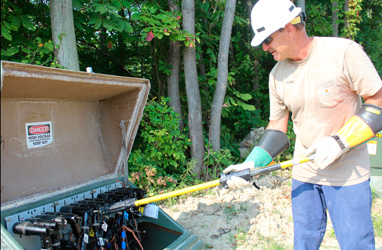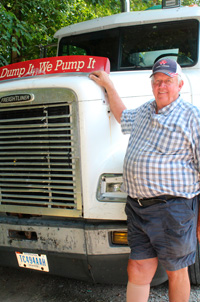September 8, 2015 • Headline News
 |
||
|
|
The Extraordinary Service Program proved to be a popular and educational meeting for many Dearborn County Hospital volunteers who attended the training session and luncheon. Pictured above with volunteers are Claudia Richardt, DCH Vice President of Human Resources, Marketing & Community Relations; Anita Benning, DCH Director of Community Relations; and Sylvia Plashko, DCH Auxiliary President. SUBMITTED PHOTO |
|
 |
||
|
|
||
|
|
St. John's Lutheran Church in Napoleon held an ice cream social on August 30. Pictured above are some of the 125 members who came to socialize and support the church. Proceeds from the event go to a church camp. MARY MATTINGLY PHOTO |
|
PAGE UPDATED BY MARIA SIEVERDING SEPTEMBER 8, 2015 11 A.M.
Sign-in digitally to vote
Mary Mattingly
EDITOR
mmattingly@ripleynews.com
This November, local registered voters will have a new way to sign in to vote. The Ripley County Council agreed at their regular meeting on August 17 to try digital devices, called e-poll books. Clerk Mary Ann McCoy proposed the idea in July, suggesting the fall election would be a good time to try it since it is usually a low voter turnout. The council was reluctant to spend the money but Know Ink, the company that approached the county about providing the service, has since lowered their fee from over $4,700 to $525. The e-poll books will allow digital identification and could save time, for the voter and for the poll workers and clerks. The information will be centralized and immediate. If someone shows up at the wrong polling place, the computer can immediately give the voter the right place, McCoy said. It scans a driver’s license and shows a voter’s name, up-to-date voting information and his or her signature. This should make lines quicker. It also enhances security. If a ballot was already sent, it will show that so they can’t vote again.
Council also noted that a few towns may not have access and that all towns need to be on board for this to work. McCoy said she will work with Know Ink and those towns for Wi-Fi access. The commissioners had given their blessing at a previous meeting, McCoy added. She said she’ll report back to the council after the election about how the new e-poll books worked.
Dirty and dangerous jobs
We’re thankful others can do these tasks!
What jobs make you squirm or go “Ewww?“ Be honest. There are just some jobs you’re downright thankful you can call on someone else. We appreciate the ones who do the dangerous jobs, the officers who go into the meth houses, the bomb squad detonators, the Ebola workers, even our firefighters who run into the burning building. But, as far as the dirty, gross or “ewww” job goes, we turn up our nose at those who have to work with waste or bodily waste. These are all legitimate forms of earning an honest dollar. In light of Labor Day, a day to celebrate the American laborer, Ripley Publishing talked to a few people who hold down these dirty or dangerous jobs.
Dangerous job: Utility lineman
Rob Hunger’s work literally made the hair on his arm stand up. This happened in the year 2000 while working for Southeastern Indiana REMC. Overlooking his protective rubber gloves one day, the Osgood linemen grabbed a “hot” power line with 7,200 volts running through it. He didn’t think it was live. He was wrong. Although you couldn’t see the internal burn, his arm was smoking, and he knew it was bad. “I never lost consciousness,” he recalled, and was coherent enough to tell the firefighter to run the red light. His arms were flapping uncontrollably from the burn. Hunger didn’t know then, but he had third degree burns, and extensive tissue and nerve damage to his left hand.
 MARY MATTINGLY PHOTO
MARY MATTINGLY PHOTO
Wearing rubber gloves and holding a safe shotgun stick Rob Hunger, a distribution lineman with SE REMC, checks on underground lines at a high voltage sectional box.
It takes one amp to kill someone, he said, and it was later calculated he had 109 amps. He shouldn’t have been breathing, much less alive “People say I was lucky. It wasn’t luck,” Hunger, said, but he believes to this day it was a true miracle of God. He can’t explain it otherwise. Five skin grafts, nerve work and six months of physical therapy later, Hunger regained use of his hand. He didn’t think he needed the pinky finger so much but the surgeon said that’s where 50 percent of your grip comes from. Hunger claims his new baby daughter kept him going. “She was good medicine!” Wife Linda took good care of both him and the baby. The accident didn’t keep him from being a journeymen lineman, and he hasn’t had another accident since. He’s worked for 37 years for REMC. “I considered other inside jobs, but I knew this was for me, and a year later I was working the lines again.”
Granted, being a lineman is not for everyone. It’s highly dangerous work, and requires 8,000 hours of on the job training and 756 classroom hours, at least REMC’s supplier Hoosier Energy requires that of its linemen, plus continual sessions on updates of new equipment, etc. Heights can’t bother you either because of the work in the bucket truck. Hunger says, “It’s like someone told me. You treat it (power lines) like a rattlesnake. You never know when it will bite!” Rubber gloves and sleeves and the insulated bucket truck provide a safety buffer. Those gloves he forgot to wear in 2000 are inspected daily. “All it takes is one pinhole to get to you,” Hunger explained. Linemen have to work in all kinds of weather, at all times. Hurricane Ike in 2008 was their worse power outage, he recalled and it took two weeks to restore power to all members. “But I like being outside, and being able to help the public by maintaining electricity for them,” he said. What job does he consider really dangerous? “An astronaut,” he replies.
-- Mary Mattingly
Dirty job: Road kill technician
Removing “road kill” can’t be a pleasant part of any job, but we’re glad someone does it. We live in a rural area and it’s not unusual to pass a dead animal on the side of the road at least once a week. Judy Schebler, 911 coordinator for the county, says whether the dead animal is on a county or state road, the local dispatch (the nonemergency number) usually gets the call. If it’s a state road, the operator then calls the Indiana Dept. of Transportation, the Seymour district, and they respond. Harry Magnity, spokesperson for INDOT, they are on the road the crews are on the road once a week specifically for litter and animal pickup. Policy calls for animals to be removed within five business days of being reported.
The county highway department will also remove dead animals, if it’s on a county road. Schebler said they used to get calls daily. It’s not just animals either, but anything that could be hazardous on the side of the road. “And, we also get couches. I don’t know why people drop them off there,” she said. In the fall, when deer are in the rut, the calls will pick up. “In November, we probably get calls every day. It’s the worst month,” Schebler said. Besides deer, raccoon, squirrels and opossums are the most common animals found along the state roads. But, they also get calls for skunk, rabbits, foxes, dogs and cats, and occasionally, a cow, horse, beaver or bobcat. “You name it and it’s been hit,” Schebler said, adding geese to the list.
The road crews are supplied with latex gloves, shovels, rakes and antibiotic treatment, and if necessary, a loader for picking up the dead animal. The state uses a lift gate or game rack on the back of a pickup for transport but bigger carcasses require a dump truck and trailer. Yes, collecting road kill can be disgusting.
-- Mary Mattingly
Dirty job: Cleaning septic
So, you think cleaning the gunk from the bottom of the garbage can or the penicillin growing on top of the tuna casserole you forgot about in the refrigerator a month ago is a dirty job? Think again! Try pumping waste out of a septic tank. THAT, my friends, is a DIRTY JOB!!!!
B & H Pumping Service of Versailles specializes in just that. That’s how Harry and Bernadette Holman have made their living for most of their lives. The Holman’s have made a lucrative business of taking care of what most people would much rather forget...ridding their homes of waste. Septic system waste consists of all the things we flush...shower water, dishwater and garbage disposal waste, and yes...toilet waste are all piped into our septic system. If you live inside the town limits, this disposal is taken care of for you via the town’s sewer structure. If you live in a rural area, you probably have a septic tank. That’s where all those ‘unpleasantries’ house themselves...temporarily.
 MARY MATTINGLY PHOTO
MARY MATTINGLY PHOTO
Harry Holman with B&H Pumping Service has a good sense of humor as evidenced by the signs on his truck:
“You Dump It, We Pump It.”
This is what you need to know about rural septic systems: Americans produce (and flush) about 50 gallons of waste every day. Homes in rural areas far from municipal sewer systems rely on septic tanks to treat household waste. Septic tanks are concrete containers buried in the ground, usually within about 30 yards of a home. These tanks are designed to hold the waste that the typical household flushes through the drains. Once the waste flows into the septic tank, the system depends on natural enzymatic bacterial action to digest the waste, which helps the material decompose. Most septic tank systems are designed to hold years of waste. Solid elements, such as grease, coffee grounds, nondisolvable items like cigarette butts, automotive and household oils and paper materials which are not decomposable can fill or clog a tank. Once a tank is filled, it must be pumped to remove the waste. This is where companies like B & H Pumping Service come to your rescue. Harry Holman and crew pump out the ‘sludge’ and excess waste that your septic system can’t in order to keep your system running smoothly and without interference.
Details about the exact process performed by a septic tank pumper seem unnecessary. Let’s just suffice it to say that B & H comes with a tanker truck, a pump, and a long industrial hose. When they’re finished, they drive off with the contents of your septic tank. After decades in the business, Holman says he has lost his sense of smell. His wife Bernadette has trained him though to remove his shoes and shower in the basement after a day on the job.
One might wonder what the worst day for a ‘Septic Tank Pumper-Outer’ might be. “One day I was working on a job in Versailles,” Holman recalled. “The valve blew off because I had forgotten to check it after I’d emptied the tank from a previous job. It covered me from head to toe.” This specialized service should be performed every two to five years in order to keep your system functioning properly. B&H Pumping Service prides itself in being “Number One in the Number Two business! Enough said.
-- Sandy Day Howard
Sign-in digitally to vote
Mary Mattingly
EDITOR
mmattingly@ripleynews.com
This November, local registered voters will have a new way to sign in to vote. The Ripley County Council agreed at their regular meeting on August 17 to try digital devices, called e-poll books. Clerk Mary Ann McCoy proposed the idea in July, suggesting the fall election would be a good time to try it since it is usually a low voter turnout. The council was reluctant to spend the money but Know Ink, the company that approached the county about providing the service, has since lowered their fee from over $4,700 to $525. The e-poll books will allow digital identification and could save time, for the voter and for the poll workers and clerks. The information will be centralized and immediate. If someone shows up at the wrong polling place, the computer can immediately give the voter the right place, McCoy said. It scans a driver’s license and shows a voter’s name, up-to-date voting information and his or her signature. This should make lines quicker. It also enhances security. If a ballot was already sent, it will show that so they can’t vote again.
Council also noted that a few towns may not have access and that all towns need to be on board for this to work. McCoy said she will work with Know Ink and those towns for Wi-Fi access. The commissioners had given their blessing at a previous meeting, McCoy added. She said she’ll report back to the council after the election about how the new e-poll books worked.
Dirty and dangerous jobs
We’re thankful others can do these tasks!
What jobs make you squirm or go “Ewww?“ Be honest. There are just some jobs you’re downright thankful you can call on someone else. We appreciate the ones who do the dangerous jobs, the officers who go into the meth houses, the bomb squad detonators, the Ebola workers, even our firefighters who run into the burning building. But, as far as the dirty, gross or “ewww” job goes, we turn up our nose at those who have to work with waste or bodily waste. These are all legitimate forms of earning an honest dollar. In light of Labor Day, a day to celebrate the American laborer, Ripley Publishing talked to a few people who hold down these dirty or dangerous jobs.
Dangerous job: Utility lineman
Rob Hunger’s work literally made the hair on his arm stand up. This happened in the year 2000 while working for Southeastern Indiana REMC. Overlooking his protective rubber gloves one day, the Osgood linemen grabbed a “hot” power line with 7,200 volts running through it. He didn’t think it was live. He was wrong. Although you couldn’t see the internal burn, his arm was smoking, and he knew it was bad. “I never lost consciousness,” he recalled, and was coherent enough to tell the firefighter to run the red light. His arms were flapping uncontrollably from the burn. Hunger didn’t know then, but he had third degree burns, and extensive tissue and nerve damage to his left hand.
 MARY MATTINGLY PHOTO
MARY MATTINGLY PHOTOWearing rubber gloves and holding a safe shotgun stick Rob Hunger, a distribution lineman with SE REMC, checks on underground lines at a high voltage sectional box.
It takes one amp to kill someone, he said, and it was later calculated he had 109 amps. He shouldn’t have been breathing, much less alive “People say I was lucky. It wasn’t luck,” Hunger, said, but he believes to this day it was a true miracle of God. He can’t explain it otherwise. Five skin grafts, nerve work and six months of physical therapy later, Hunger regained use of his hand. He didn’t think he needed the pinky finger so much but the surgeon said that’s where 50 percent of your grip comes from. Hunger claims his new baby daughter kept him going. “She was good medicine!” Wife Linda took good care of both him and the baby. The accident didn’t keep him from being a journeymen lineman, and he hasn’t had another accident since. He’s worked for 37 years for REMC. “I considered other inside jobs, but I knew this was for me, and a year later I was working the lines again.”
Granted, being a lineman is not for everyone. It’s highly dangerous work, and requires 8,000 hours of on the job training and 756 classroom hours, at least REMC’s supplier Hoosier Energy requires that of its linemen, plus continual sessions on updates of new equipment, etc. Heights can’t bother you either because of the work in the bucket truck. Hunger says, “It’s like someone told me. You treat it (power lines) like a rattlesnake. You never know when it will bite!” Rubber gloves and sleeves and the insulated bucket truck provide a safety buffer. Those gloves he forgot to wear in 2000 are inspected daily. “All it takes is one pinhole to get to you,” Hunger explained. Linemen have to work in all kinds of weather, at all times. Hurricane Ike in 2008 was their worse power outage, he recalled and it took two weeks to restore power to all members. “But I like being outside, and being able to help the public by maintaining electricity for them,” he said. What job does he consider really dangerous? “An astronaut,” he replies.
-- Mary Mattingly
Dirty job: Road kill technician
Removing “road kill” can’t be a pleasant part of any job, but we’re glad someone does it. We live in a rural area and it’s not unusual to pass a dead animal on the side of the road at least once a week. Judy Schebler, 911 coordinator for the county, says whether the dead animal is on a county or state road, the local dispatch (the nonemergency number) usually gets the call. If it’s a state road, the operator then calls the Indiana Dept. of Transportation, the Seymour district, and they respond. Harry Magnity, spokesperson for INDOT, they are on the road the crews are on the road once a week specifically for litter and animal pickup. Policy calls for animals to be removed within five business days of being reported.
The county highway department will also remove dead animals, if it’s on a county road. Schebler said they used to get calls daily. It’s not just animals either, but anything that could be hazardous on the side of the road. “And, we also get couches. I don’t know why people drop them off there,” she said. In the fall, when deer are in the rut, the calls will pick up. “In November, we probably get calls every day. It’s the worst month,” Schebler said. Besides deer, raccoon, squirrels and opossums are the most common animals found along the state roads. But, they also get calls for skunk, rabbits, foxes, dogs and cats, and occasionally, a cow, horse, beaver or bobcat. “You name it and it’s been hit,” Schebler said, adding geese to the list.
The road crews are supplied with latex gloves, shovels, rakes and antibiotic treatment, and if necessary, a loader for picking up the dead animal. The state uses a lift gate or game rack on the back of a pickup for transport but bigger carcasses require a dump truck and trailer. Yes, collecting road kill can be disgusting.
-- Mary Mattingly
Dirty job: Cleaning septic
So, you think cleaning the gunk from the bottom of the garbage can or the penicillin growing on top of the tuna casserole you forgot about in the refrigerator a month ago is a dirty job? Think again! Try pumping waste out of a septic tank. THAT, my friends, is a DIRTY JOB!!!!
B & H Pumping Service of Versailles specializes in just that. That’s how Harry and Bernadette Holman have made their living for most of their lives. The Holman’s have made a lucrative business of taking care of what most people would much rather forget...ridding their homes of waste. Septic system waste consists of all the things we flush...shower water, dishwater and garbage disposal waste, and yes...toilet waste are all piped into our septic system. If you live inside the town limits, this disposal is taken care of for you via the town’s sewer structure. If you live in a rural area, you probably have a septic tank. That’s where all those ‘unpleasantries’ house themselves...temporarily.
 MARY MATTINGLY PHOTO
MARY MATTINGLY PHOTOHarry Holman with B&H Pumping Service has a good sense of humor as evidenced by the signs on his truck:
“You Dump It, We Pump It.”
This is what you need to know about rural septic systems: Americans produce (and flush) about 50 gallons of waste every day. Homes in rural areas far from municipal sewer systems rely on septic tanks to treat household waste. Septic tanks are concrete containers buried in the ground, usually within about 30 yards of a home. These tanks are designed to hold the waste that the typical household flushes through the drains. Once the waste flows into the septic tank, the system depends on natural enzymatic bacterial action to digest the waste, which helps the material decompose. Most septic tank systems are designed to hold years of waste. Solid elements, such as grease, coffee grounds, nondisolvable items like cigarette butts, automotive and household oils and paper materials which are not decomposable can fill or clog a tank. Once a tank is filled, it must be pumped to remove the waste. This is where companies like B & H Pumping Service come to your rescue. Harry Holman and crew pump out the ‘sludge’ and excess waste that your septic system can’t in order to keep your system running smoothly and without interference.
Details about the exact process performed by a septic tank pumper seem unnecessary. Let’s just suffice it to say that B & H comes with a tanker truck, a pump, and a long industrial hose. When they’re finished, they drive off with the contents of your septic tank. After decades in the business, Holman says he has lost his sense of smell. His wife Bernadette has trained him though to remove his shoes and shower in the basement after a day on the job.
One might wonder what the worst day for a ‘Septic Tank Pumper-Outer’ might be. “One day I was working on a job in Versailles,” Holman recalled. “The valve blew off because I had forgotten to check it after I’d emptied the tank from a previous job. It covered me from head to toe.” This specialized service should be performed every two to five years in order to keep your system functioning properly. B&H Pumping Service prides itself in being “Number One in the Number Two business! Enough said.
-- Sandy Day Howard

















